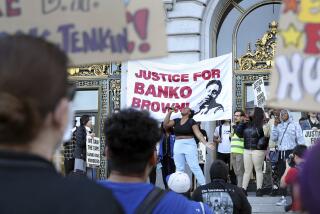Hawkins Case Defense: Bad Medical Care
- Share via
Gang member Anttwon Thomas died from loss of blood due to inadequate medical attention rather than as the direct result of a shotgun wound allegedly inflicted by murder defendant James Hawkins Jr., according to a medical expert that defense attorneys plan to call before a Los Angeles County jury today.
But the doctor’s testimony provides no defense to the homicide charges even if it were deemed totally true, Deputy Dist. Atty. Harvey Giss contended before Superior Court Judge Ronald S. W. Lew Thursday.
Giss, without conceding that the testimony is accurate, argued that Lew should limit the doctor’s testimony before the jury concerning Thomas’ cause of death, citing a landmark 1947 California case, People vs. McGee. That decision states that a surgeon’s negligence cannot be cited as a murder defense if the defendant inflicted a dangerous wound on another.
Lew is expected to decide today whether to allow the testimony from Dr. Robert Bucklin, a supervising pathologist for the San Diego County coroner’s office.
Bucklin, in a hearing this week without the jury present, testified that the shotgun wound to Thomas’ chest “was serious (but) it was not fatal.”
Bucklin proceeded to criticize Thomas’ care at Martin Luther King Hospital, where he was rushed after the 1983 incident. The hospital, he contended, did not provide Thomas with enough blood to restore the amount he had lost, apparently because its blood bank was empty.
“It’s incomprehensible that a situation like this would exist, that inadequate blood would be available for needed emergency situations such as this one,” swore Bucklin, who was employed by the Los Angeles County medical examiner’s office between 1974 and 1984.
Thomas, 19, was shot outside the Watts grocery of Hawkins’ father, James Hawkins Sr., after an incident in which Thomas and other gang members accosted a family riding their bicycles past the Nickerson Gardens housing project. The defense claims that Thomas was shot accidently after he pulled a sawed-off shotgun from his trousers during an argument with Hawkins Jr. moments after Hawkins and his father had broken up the bicycling incident. The prosecution charges that Hawkins Jr., using his own shotgun, shot Thomas in cold blood a full 10 minutes after he and Thomas first exchanged words.
National Attention
The Hawkins clan drew national attention after the September, 1983, shooting, which led to two nights of violence against their home and business by local gang members. Shortly after the retaliations--but long before charges were filed against Hawkins Jr.--Mayor Tom Bradley and police officials voiced support for the embattled family at a press conference at their shop.
Defense attorney Janis Rader, speaking outside the courtroom Thursday, said Hawkins Jr. cannot be found guilty of murder because “Tony Thomas died because there wasn’t enough blood.”
Giss, arguing that such evidence is irrelevant even if it were true, cited from the McGee case: “When a person inflicts a wound on another which is dangerous or calculated to destroy life, the fact that the negligence, mistake or lack of skill of an attending physician or surgeon contributes to the death affords no defense to a charge of homicide.”
In addition, Giss noted, Dr. James V. Wegner, a deputy county medical examiner, has previously testified that Thomas died as a consequence of the shotgun wound.
The defense called a second medical witness, Dr. Herman Hammerstead of San Diego, to the stand Thursday. But Lew refused to allow Hammerstead, a vascular surgeon, to testify about Thomas’ loss of blood.
More to Read
Sign up for Essential California
The most important California stories and recommendations in your inbox every morning.
You may occasionally receive promotional content from the Los Angeles Times.













